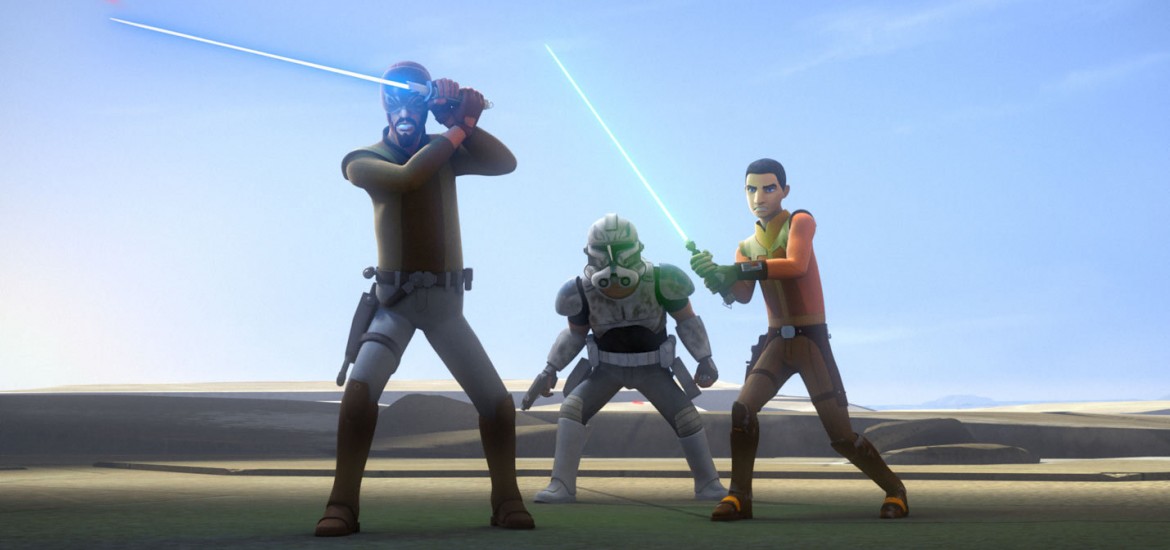Welcome! Quick note: this is not a full review. Here, we take a look at a few aspects – and then throw them in the ring to fight it out for our personal amusement. At which point one breaks free of its chains, leads a slave revolt and makes a dash for freedom proclaiming: ‘I am Roger! Roger!’ As always, SPOILERS from here on out.
This week on Rebels, The Last Battle, Rex is haunted by his past as the past comes back to haunt the Spectres and a certain droid invokes the long held military tradition of ‘no takesies backsies’.
(Un)Bending Reality

It may sound weird, but with science fiction and fantasy stories, it pays to keep certain aspects grounded in reality. Yet at other times, confusingly, it’s okay to not be quite so realistic. Like with sound in space: in reality there is none – but it’s rare to see a story in the visual medium hold to show this. Maybe once, a long time ago* this knowledge was the reserve of scientists (and really, really nerdy civilians) so film-makers and the movie-going public wouldn’t have known this – and would have made space movies with sound and expected to see said space movies with sound, respectively. This may not hold true any more, but it’s an established rule and as such it’s hard to displace. More than that, though, for those of us who aren’t deaf, sound is one of our main senses and it’s difficult to deny that while making a space movie. If we’re not used to having no sound during a scene, that may be quite jarring and consequently take you out of the experience. Unless that’s specifically what you’re going for by denying a sensory experience to the viewer, this is something you generally don’t want.
*In this galaxy. Not descending to such a cliché.
This has absolutely nothing to do with the episode at hand, by the way, but the parellels are useful for what was in the episode: Post-traumatic stress disorder, or PTSD. Its treatment of the anxiety disorder was … let’s go with problematic.

The first problem is fairly minor, but worth bringing up: Rex’s PTSD exists only for this episode. This is somewhat lazy writing, in that it takes a large aspect of his character and treats it as a small, one off thing that will likely have no consequences beyond this one episode (indeed I can’t recall a single instance of it rearing its head previously). This is also bad because it’s not true at all to reality. For real sufferers of PTSD, it is an ongoing struggle. It’s not just a one-off thing, but can happen at any moment even years down the line – just as it does with Rex.
The second problem is much more major in that, at the end of the episode, Rex is seemingly cured of this particular ghost of his past. (While this wasn’t too clear in the episode, Rebels Recon addresses this subject and confirms this to be the case). In reality, this sadly doesn’t happen. There’s no defining experience to offer closure. In reality PTSD often isn’t cured – in the sense that it disappears completely. For many, at best it can only be managed via medication and cognitive behavioural therapy. Such therapy can take months (in severe cases, years). Again, even after the therapy course has been completed, it wouldn’t fully disappear.
As I type this, my mind goes back to the sound in space thing. ‘It’s fiction! It doesn’t have to be realistic!’ I hear myself think. The problem with that is that fiction often determines our reality. No one person can reasonably have first hand experience of all that this world has to offer and as such we tend to rely on fiction to tell us what it’s like to experience things we haven’t or may never experience. As a man, I don’t know what it’s like to experience life as a woman and to experience the disadvantages that women experience because of their gender. As a white man, I don’t know what it’s like to be a person of colour and experience the disadvantages based on skin colour. I do have a problem with anxiety, so it’s important for me to see accurate representations of that, though. Even then, it’s just one type of mental disorder. I don’t know what it’s like to be bipolar, or schizophrenic, or even to have OCD – something that is very common in stories and is often portrayed as a mild cleanliness quirk, which is not the reality.
Moreover, it’s important to get things like PTSD correct because, unlike going into space and not being heard screaming, thousands of people do live with this, and even if someone doesn’t have it, they will still likely know someone who does suffer from PTSD – because remember that this disorder isn’t just the preserve of soldiers but many people from different walks of life can and do get PTSD from a number of stressful and traumatic situations. This is something real and tangible (in the sense that you can touch people with PTSD. Which you should not do. I really should have thought this sentence through). As such, it needs to be accurate because it better enables us – those without PTSD – to understand those with it and to be better able to interact with them as people, rather than just a disorder on legs. Thus far, I’ve (deliberately) only spoken about what it would be like as someone without it – and that’s because I can only imagine what it would be like to be one affected by PTSD and see their experience on screen. This matters because this isn’t some far-fetched experience like being hunted by some space monster – but a thing that is sadly all too common in our real world.
Ignorance Then, Ignorance Now

In another, much more positive way, this episode dealt with the subject of ignorance – specifically, how pretty much everyone could give Jon Snow a run for their money.
Okay, that’s a little unfair – because the show does a pretty good job of demonstrating how little everyone knows while also laying the groundwork to enable us, the viewers, to work it out on our own. Both Rex and Kalani, the Super Tactical Droid (or ‘Droid In Chief’ as I liked to call him), believed that they had ultimately lost the war – which is true. The only real victor was Emperor Palpatine – but curiously they don’t name him, and as far as I recall, they never have. They place the blame on the Empire, not the one who orchestrated the whole thing for personal gain. This ably shows the disconnect between the front lines troops and the political field, as well as the disconnect between Palpatine and, well, pretty much everyone.
It also shows just how minor these characters are in the grand scheme of things – and this is something that’s demonstrated in another way, too.
This episode leans heavily on its predecessor, The Clone Wars, and specifically the lore of the show. It’s fairly safe to assume that many viewers of Rebels also watched The Clone Wars – but many didn’t, too, so the showmakers must take pains to explain the rules of this new world to us, the viewers. Enter Ezra Bridger, the one who was born just as that era came to a close. Throughout, Kanan and Rex explain to him precisely what you have to do to survive in this new-old world (that’s a thing, right?).
It also subtly reminds us that there’s this whole galaxy outside of the purview of the show and that Ezra, hero that he is and main character of his own show, is merely one person and one small cog in this galaxy full of stories.
I did say cog, right? I did? Phew.
Author: Michael Dare
Michael Dare is a writer, lives in the UK, and has been slowly coming to terms with the realization that he is not Sherlock, but Watson. He loves Star Wars, dislikes blue milk. Enjoys jumping sharks. Survives on the tears of sexist men, and cheeseburgers.

I’m not convinced Rex actually was suffering from PTSD. He got knocked unconscious and was disoriented when he woke up with all of the images from the Clone Wars right there in front of him.
It seemed more like he just had a momentary “waking nightmare” for a few seconds until he could focus on Kanan and get back to full consciousness.